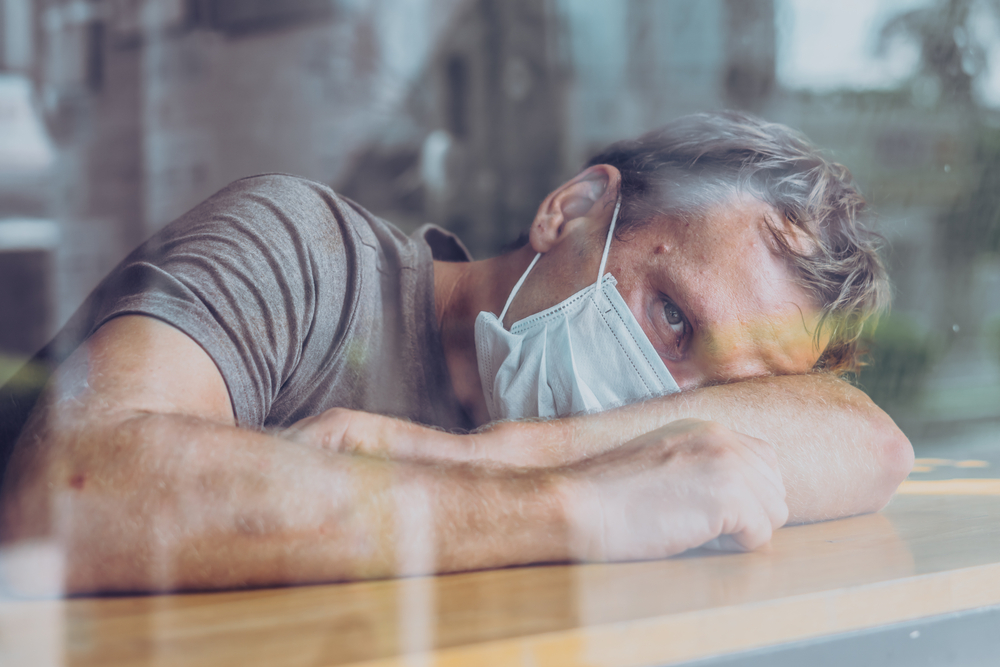No one has been untouched by COVID-19.
Forced isolation and fear of infection can leave profound social — and psychological — scars. All of us, the employed and unemployed, landlords and homeless, very young and the elderly, have been affected as the world confronts this deadly coronavirus.
What’s more, adversities that predated the virus have increased in prevalence, significance, and severity. As a consequence of the multitude of stressors, everyone in the community is at heightened risk of worsening or developing psychiatric morbidity.
For people suffering mental illness before the virus, whether active or in remission, the management of their condition(s) has become more complicated, compromised both by the obstacles inherent to this era and the fears engendered by it. While the nature of this relationship will vary with the type of illness and its manifestation, it is essential for claims managers to fully understand the forces influencing mental health outcomes and ask the right questions to best manage these cases.
Access to Professional Assistance
The social isolation demanded by public health authorities can directly interfere with a person’s ability to consult with health professionals face-to-face. Anecdotal reports suggest a substantial fall in the number of individuals presenting for acute mental health assistance during this crisis. While some people have transitioned smoothly to web-based communications, an array of factors continues to frustrate many. Although there are no studies upon which to verify the relative utility of the telehealth approach in mental health care provision, it is generally accepted that a face-to-face encounter is of superior efficacy to the so-called “remote” approaches. This is particularly the case when technology fails to provide an uninterrupted and spontaneous interaction.
Financial hardship can further compromise access to all aspects of healthcare, including professional consultations. Declining incomes amid the pandemic could place mental health services increasingly out of reach.
Access to Medications
Other trends can also reduce patients' access to prescriptions to managing mental illnesses. To economize, individuals may begin to skip purchases or taper doses. Also, prescribed medications may not be used as regularly as recommended when that use is not adequately supervised by treating clinicians. Authorities have reported panic buying and medication “stockpiling” in some locations; for this and perhaps other reasons related to global supply chain disruptions, some medications have been found to be in short supply.
Pursuit of Psycho-behavioral Interventions
Regular exercise, social interactions, and even attending a workplace are all important aspects of a holistic protocol for the minimization of symptoms of mental ill-health and the prophylaxis against relapse. Requirements for social distancing have significantly compromised these pursuits.
For example, with social anxiety disorder (formerly known as social phobia) and obsessive-compulsive disorder, therapeutic behavioral strategies for minimizing symptoms are now actively, and appropriately, discouraged so as to limit the spread of the virus. As a consequence, there is a real potential for COVID-19 containment strategies to unintentionally and unhelpfully exacerbate or even rekindle dormant disorders. It remains to be seen whether this virus, and society’s response to it, results in a surge of such conditions in the longer term.
For a variety of reasons, persons with a propensity to mental illness are encouraged to adopt a healthy diet. However, obtaining nutritious food is also more difficult now because of a variety of factors, including disrupted supply chains and diminishing personal funds.
Impact of Home Isolation
Even for those who are comfortable with their own company, protracted isolation can be very challenging. Remote communication provides some compensation, but this may not be enough, especially for those who are vulnerable to certain mental illnesses. Particularly affected are those who reside alone and the elderly and disabled, who are more reliant upon assistance from others. And let us not forget those who are currently deprived of those therapeutic ‘cuddles’ from those family members with whom they cannot now spend time.
With relatively little else to do, many are spending too much time at home watching or listening to dark, dystopian newscasts about COVID-19. This information saturation, left uninterrupted, can promote unproductive anxiety — obsessional rumination — and can leave many feeling helpless and hopeless. Paradoxically, those who are more worried are likely to seek more information to reduce uncertainty and are often less able to resist the magnetic pull of these gloomy broadcasts. Social media has provided an array of outlets to offset the burden of isolation, but information promulgated on social channels is often both more unreliable and prone to escalating fear and angst.
A minority of the population, by token of personality structures and/or mental illness, can find interpersonal function sufficiently challenging. For this group, the policy of social distancing can both provide a welcome relief and inadvertently reinforce a tendency to avoidance. While it makes sense to wait for this period to pass to assess this cohort, it is not unlikely that some will find reintegration into post-COVID-19 life unexpectedly difficult.
Those required to reside in close quarters with others can face a somewhat different challenge. Whilst many joke about the stresses which arise among people who generally get on well, little is said of the enormous pressure placed on relationships that were already strained before the virus. Anecdotal accounts in the media suggest rates of domestic violence and substance misuse may be increasing.
Accommodation Options
Social isolation and economic dislocation have also worsened an existing housing crisis. Demand for supported accommodation is rising, even as the available emergency shelter space is shrinking. Welfare organizations, which were already overwhelmed by need, are currently compelled to reduce occupancy capacities to allow appropriate social distancing in their facilities.
This avenue, which has provided protection to so many in the past, is becoming less viable, and more people may be forced to remain in adverse circumstances or live on the streets.
Fear of Infection, Loss, and Bereavement
Even at a time of social isolation, many employees continue to report to shared workplaces and have had to increase hygiene practices, such as washing hands using antimicrobial lotions liberally and wiping down shared desks, phones, chairs, and computers multiple times per day. Proximity to other people can feel particularly threatening, particularly in corridors, elevators, and doorways with handles that all must grasp. This undercurrent of low-level but persistent anxiety is now commonplace across our community, driven by concern that one might unwittingly contract the virus and even spread it to dear ones. Many are losing sleep as a consequence, and some people are reportedly even dreaming about COVID-19.
And then there are those being asked to work on the front lines. In this day and age, “frontline” describes not only heroic healthcare workers but also everyone from hospital cleaners to supermarket checkout staff who confront a higher degree of risk due to more exposure to the general public. For people surviving or staving off mental illness, working in any such roles, or being related to someone who does, brings a new dimension of traumatic anxiety to life in the COVID-19 era, with commensurate mental health liability.
Recommendations for Mental Disease Management
For those struggling in the context of past, present or potential mental illness, some general recommendations may be helpful (but may not be applicable in all instances). It is important to recognize that some level of anxiety and concern is normal at this time. Moderate anxiety about COVID-19 can help people remain protectively vigilant and may not need to be treated with medications or substances. Individuals can assert some control over their anxiety by adhering to the advice of health authorities and by considering and following some of the simple steps detailed below:
- Keeping in touch with friends and loved ones.
- Introducing or maintaining daily and weekly routines as a protective strategy. These might include exercise regimes, safe shopping, cleaning, and contacting friends and relatives.
- Occupying one’s time with pursuits that do not engender negativity. For example, trying to send three positive texts or emails per day.
- Not neglecting exercise, personal grooming, and general health strategies; maintaining regularly scheduled health monitoring as best the individual is able, as recommended by a physician.
- Pursuing a healthy diet, as there is increasing evidence that fast-food, highly processed, or high-sugar diets are not only harmful biologically but also psychiatrically.
- Similarly, alcohol can be toxic to both the body and the mind, particularly in excess, and should not be used to reduce one’s distress.
- Restricting exposure to COVID-19 information updates, moderating the frequency of news updates, and considering the reliability of source(s).
- Reaching out to an appropriate helping agency when feeling overly burdened by isolation, anxiety, or fear. Employed individuals may also have access to various employer-provided assistance programs.
- Recognizing that this era of social isolation will pass. Those who are avoidant and overly relieved by social isolation can seek out a mental health professional and consider performing techniques such as imaginal exposure to minimize the social deconditioning associated with a lengthy period of isolation.
- Considering remote communication with treating health professionals. Though this approach is often less than ideal, it is better than forgoing treatment and should be maintained. Medication regimes, in particular, should not be altered without consultation.
Questions for Claims Case Managers
Here are suggested questions for claims case managers to ask their clients with mental health-related claims:
- Ask the client about COVID-19 and the ways he or she has been impacted. Such enquiry might extend to whether excessive amounts of time are being spent absorbing gloomy newscasts or pursuing health information from unreliable sources. If so, this practice might be gently challenged.
- Enquire about the status of relationships within the home and, if indicated, suggest that these might be discussed with the involved health practitioner(s).
- If the client is still attending a workplace while recovering from mental illness, is he or she comfortable that there are appropriate measures in place to protect from the risk of infection or transmission?
- If the customer is working from home, how well is this working for him or her? Are there ways that the insurer can assist?
- Enquire about the continuity of treatment during this time. Has the client maintained compliance with the treater’s scheduling of appointments? If not, identify the obstacles, financial or technological, and consider what assistance, if any, the insurance company might offer.
- Do the requirements of social distancing and regular handwashing somehow feed into the manifestations of this person’s mental illness? If so, this might warrant discussion with the treating practitioner.
- Has the client sought assistance if/when required from a health professional? If not, explore and consider avenues for assistance.
- Has the client remained compliant with medication prescription(s)?
- What has the client done to maintain a level of physical exercise during this period?
- Has he or she been mindful of a healthy diet?
- Has the client’s use of alcohol (and, where relevant, illicit drugs) been unhelpfully exacerbated at this time? If so, has this been discussed with the treating health practitioner(s)?
- What is the client doing to promote or maintain social interaction during this time?
- Does the client maintain a daily routine? Whether or not he or she is working, how is the client spending each day? The case manager might consider whether there is an opportunity for the company’s rehabilitation personnel to make recommendations regarding the client’s productive use of spare time.
Summary
The novel coronavirus, COVID-19, not only co-opts our cells, but it also exploits our anxieties and fuels mental disorders. Social and emotional dislocations caused by the pandemic challenge all of us, but by following certain practical steps we can address and manage this crisis together.



